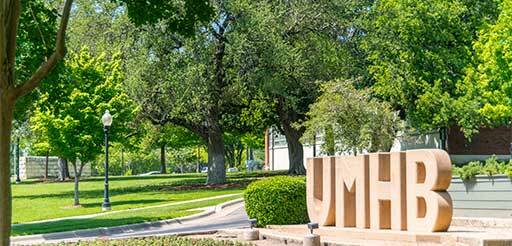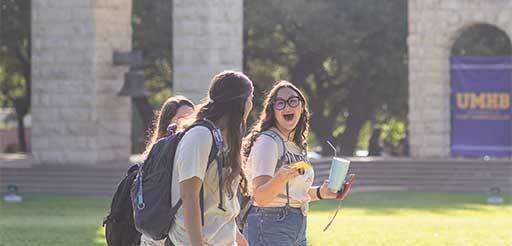Health & Safety Protocols
These plans are based on federal, state, and local regulations and guidance that available at this time, as well as public health recommendations. As the situation with COVID-19 is fluid, they are subject to change.
Daily Health Monitoring
Monitor your personal health status daily (self-screening). Commuter students must not come to campus and residential students must not leave their campus living quarters if they have any of the following symptoms:
- Cough
- Shortness of breath or difficulty breathing
- Chills
- Repeated shaking with chills
- Muscle pain
- Headache
- Sore throat
- New loss of taste or smell
- Nausea or vomiting
- Diarrhea
- Feeling feverish or a measured temperature greater than or equal to 100.0 degrees Fahrenheit
- Congestion or runny nose
- Known close contact with a person who is lab confirmed to have COVID-19
If you develop symptoms while on campus, immediately put on your face mask and leave the area, then report as outlined in the Mandatory Reporting of Symptoms or Exposure section of this plan.
The university will send periodic text reminders regarding daily screening.
Campus housing, athletics programs, and/or some clinical programs with unique risks associated with their operations may establish more stringent controls for students, including, but not limited to, daily temperature checks and health status questionnaires. Student confidentiality will be safeguarded at all times during such procedures.
Student Health Services is available to assist you, and more information can be found online at https://www.umhb.edu/resources/health/home.
Please note: other UMHB faculty and staff cannot provide medical or nursing assessment, consult with you about your symptoms or possible diagnosis, or recommend treatment.
COVID-19 Testing
Due to the limited availability of COVID-19 tests, UMHB currently will not offer testing resources on campus. If you suspect you are in need of a COVID-19 test, or are instructed to be tested, contact your personal healthcare provider or see area resources for testing at https://www.dshs.state.tx.us/coronavirus/testing.aspx.
In consultation with local health officials and medical professionals in infectious disease, UMHB has determined that at this time, “mass testing” of our campus community is not recommended in this area of central Texas. A negative test indicates that at the time a sample was collected, an individual was either negative for the coronavirus or the sample was collected too soon for the virus to be detected. A negative test is not assurance that after the sample was collected, an individual did not experience a subsequent exposure and thus, may lead to a “false sense of security”.
The health protocols of social distancing, frequent hand washing or hand sanitizing, the use of face coverings, and daily-screening and mandatory reporting of symptoms or known close contact to an individual who is lab-confirmed to have COVID-19 are the best ways to mitigate the potential exposure to others.
Healthcare Expenses
UMHB is not responsible for any healthcare expenses you may incur while enrolled as a UMHB student. UMHB strongly recommends that each student maintain healthcare insurance. Students may be required to show proof of individual medical insurance acceptable to UMHB as a condition of participation in some university programs or activities.
What health supplies should I bring to campus with me?
- Insurance Card
- At least 2 face coverings
- Thermometer
- Hand Sanitizer
- Tissues
- Over-The-counter medications
Social Distancing
To be together, we must remain apart. The importance of maintaining social distancing of 6 feet or more at all times during class cannot be emphasized enough. Social distancing is among the most important factors to mitigate potential risk of exposure to COVID-19. Increasing the physical distance between individuals can reduce transmission of the virus, and everyone must consistently follow social distancing practices. In all shared spaces, maintaining social distancing of at least 6 feet is required. It doesn’t come naturally to most people because we live and work in a community. It will take a conscious effort on everyone’s part, every minute of every day. We can do it!
Doors, Desks, and Counters
Please do not hold doors open for others at this time. Social distancing can be compromised. It’s also easy to walk right up to a desk or counter (and the person behind it) with a task in mind. Please be particularly mindful of maintaining social distance when you walk toward those sitting at a desk, computer, or lobby/ counter area. For those of you who work in such areas, polite reminders are appropriate. So is politely stepping back or rolling your chair back.
Signage
Signage is being placed at various locations around campus to further remind us of these protocols. If additional or different signage is needed, please contact Dr. Steve Theodore via your vice president or dean. All signage will be coordinated through Dr. Theodore.
Handshaking
Avoid handshaking and other greetings that require physical contact. Greet people in new and friendly ways. It’s normal to walk toward someone to shake their hand, but you can wave and smile instead.
Flow of Foot Traffic
In densely populated buildings, follow signage for spacing and paths of travel. In the absence of signage, stay to the right side of any hallway or stairs while others are passing.
Face Coverings and Face Masks
When used properly, face coverings can reduce transmission of the virus. Appropriate use of face coverings is important in minimizing risk to the wearer and those around them. A face covering is not a substitute for social distancing.
Cloth face coverings are meant to protect other people in case the wearer is unknowingly infected but does not have symptoms. Cloth face coverings are not respirators or disposable face masks; they will not protect you from exposure and are only intended to help contain your respiratory droplets from being spread to other people. Information on cloth face coverings can be found at www.cdc.gov/coronavirus.
Face coverings must cover the person’s mouth and nose at all times. Students and employees are required to have a face covering in their possession at all times while on campus and to be prepared to quickly put it on, if needed or instructed to do so.
Where are Face Coverings Required on Campus?
In accordance with CDC guidelines, all UMHB community members are required to properly wear face coverings or face masks:
- Upon entering all campus buildings
- In all common areas and shared environments on campus, including hallways, restrooms, elevators, or university-provided group transportation (i.e. vans).
- Into classrooms and lecture halls and for students, throughout the duration of the class.
Faculty must wear a mask until everyone is seated and properly socially distanced in class. Faculty may or may not wear a mask while they are teaching, as they prefer.
Students and employees are typically not required to wear face coverings in outdoor areas of the campus, as long as appropriate social distancing is maintained.
Students are required to furnish their own face coverings or face masks that conform to CDC guidelines; plan to bring at least two to campus. Face masks and other personal protective equipment may be furnished to students in certain clinical or laboratory settings.
The UMHB Campus Store has cloth face coverings available for sale while supplies last. Students who cannot financially afford their own mask or face covering may contact The Source at tsquarcette@umhb.edu or Dr. Brandon Skaggs, Vice President for Student Life, at (214) 704-1168 or Michael Burns, Dean of Students at (405) 308-7336.
Caring for Your Face Covering
All face coverings should be routinely washed or discarded, depending on the frequency of use and the manufacturer’s instructions. Do not leave used face coverings lying around on desks, counters, furniture or other areas. Store face coverings in paper or plastic bags.
Putting On Your Face Covering Properly
- Wash your hands.
- Inspect the face covering.
- Place the loops over your ears.
- Ensure the face covering is worn properly.
Removing Your Face Covering Properly
- Grab the loops and pull it away from your face. Be careful not to touch your eyes, nose or mouth while removing the face covering.
- Dispose of the face covering after using it. If you have a face cloth covering, carefully put it in a plastic bag after use and take it home to wash it.
- Wash your hands after touching the face covering.
Face Covering Waivers for Medical Conditions
Students may be excused from wearing face coverings only in the event of medical conditions that contraindicate wearing a face mask. In such cases, it is the student’s responsibility to request medical accommodations (a face mask waiver) by contacting the Student Disability Services office directly. If approved, Student Disability Services will provide the student with the appropriate written waiver to present when needed on campus. Information can be found at https://www.umhb.edu/resources/disability/home#1845.
Employees may be excused from wearing face coverings only in the event of medical conditions that contraindicate wearing a face mask. In such cases, it is the employee’s responsibility to request medical accommodations (a face mask waiver) by contacting the Human Resources Division directly: kgreen@umhb.edu, (254) 295-4922, or susan.owens@umhb.edu, (254) 295-4527. If approved, the employee will be provided with the appropriate written waiver to present when needed on campus.
Personal Hygiene and Etiquette
All members of the UMHB community are expected to maintain responsible personal hygiene and etiquette. To encourage good personal hygiene, signage is posted throughout campus.
- Washing your hands: To properly wash your hands, reference this CDC how-to video.
- Sanitizing your hands: If soap and water are not readily available, you can use an alcohol-based hand sanitizer that contains at least 60% alcohol. To properly use hand sanitizer, reference this how-to video.
- Coughing and Sneezing: To help stop the spread of germs:
- Bring a supply of tissues with you.
- Cover your mouth and nose with a tissue when you cough or sneeze.
- Throw used tissues in the trash.
- If you don’t have a tissue, cough or sneeze into your elbow, not your hands.
- Immediately wash your hands after blowing your nose, coughing or sneezing.
Be mindful of frequently touched items (door knobs, elevator buttons, copy machines, etc.).
- Avoid sharing telephones (desk phones or cell phones).
- Avoid sharing pens, tape dispensers, staplers, tools, etc.
- Have your own pen handy.
- Avoid passing papers around.
Page last updated December 03, 2020



